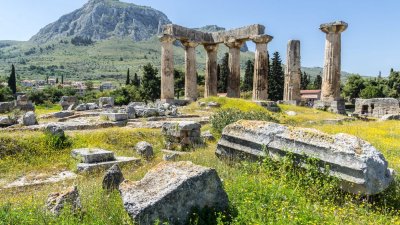


June 6-10, 2022
Reflections on Excelling in Faith


The pursuit of excellence?
June 8, 2022 • Ed Green • 2 Corinthians 8:7
We just wrapped up this year’s “graduation season.” The past few years have seen more and more high schools do away with the traditional valedictorian and salutatorian (the first and second students with the highest class rank), and move to the Latin system used in most colleges and universities ("cum laude," etc.). It has been a source of no little debate in communities and school districts across the nation. Cynics would say this is just another indication of a generation that has grown up receiving participation trophies their whole childhood. But wait, there’s this: “Th[e] societal norm of challenging each other to be better is in itself a good and a bad thing. We all need to be pushed and challenged into being the best that we can be, but there is a point where it becomes too much. When children who are 13, 14, or 15 need to start taking Zoloft and Lexapro because of the stress their parents put on them for good grades, there's something wrong with the system” http://(https://www.theodysseyonline.com/should-we-get-rid-of-the-valedictorian). I’ll leave it up to you to figure out which position may be best. But the desire for excellence must not be confused with being “the best” or “the top” or being “perfect.” In 2 Corinthians 8:7 Paul writes this: “But since you excel in everything—in faith, in speech, in knowledge, in complete earnestness and in the love we have kindled in you—see that you also excel in this grace of giving” (NIV). The word he uses in the original Greek that lies behind “excel” carries the idea of “abundance” or “beyond all measure.” Overflowing. The Corinthian believers had a high opinion of themselves. They thought they were doing pretty well. But Paul’s letters suggest they weren’t as far along as they thought. But in this instance, he leverages their belief about their own maturity to encourage them to also excel in the opportunity to be generous. Each of these six aspects of our lives deserves to be invested in, for us to abound in. For the next several weeks we will explore each of these. Which of these in your own life do you think you are doing well in? Which one do you know needs some attention?


What does "faith" look like?
June 10, 2022 • Ed Green • Luke 7:1–10, Hebrews 11
We were reminded yesterday that faith involves action. Faith is embodied belief. It might well be translated in many places as “trust,” or, as Matthew Bates suggests, “allegiance.” (Bates has written a few books exploring this idea of faith as allegiance to King Jesus.) In contrast to Dawkins whom I quoted yesterday, faith is not belief in spite of the evidence; rather, it is choosing, in light of the evidence, to take steps that go beyond that evidence. Some people call that a “leap” of faith. Perhaps, but it is not a blind leap. This is where I think the idea of “trust” comes in. God has proven himself to be faithful over and over again. Because of those stories in Scripture—and our own personal experience—we have learned to trust the Lord. There is an account recorded in Luke 7:1-10. A Roman centurion has a servant who was very sick. He has apparently heard about Jesus and his healing miracles, so he sends to Jesus and asks him to heal his servant. When Jesus offers to come to his home, the centurion sends friends to tell Jesus that he is unworthy of such a visit. He believes all Jesus has to do is say the word, and the healing will take place. When the Lord hears this, he marvels and says, “I tell you, I have not found such great faith even in Israel” (7:9). The centurion trusts in the Lord because of what he has heard; yet his faith goes beyond even those stories. In Hebrews 11, the author spends the entire chapter describing how faith looked in the lives of those who trusted the Lord in the Old Testament (and beyond). He looks at the lives of such luminaries as Abraham and Enoch and Moses and many others. The refrain over and over is, “by faith…” Spend some time today reflecting on this chapter and the illustrations of faith the author provides. As you seek to “excel in faith,” what is one step that you can take to invest in this biblical concept of faith as trust, or allegiance, to the Lord?


What faith is NOT
June 9, 2022 • Ed Green • James 2:14–26
“Faith is the great cop-out, the great excuse to evade the need to think and evaluate evidence. Faith is belief in spite of, even perhaps because of, the lack of evidence.” So says outspoken atheist Richard Dawkins. The Corinthian Christians thought that they abounded in faith. There are a lot of false understandings “out there” of just what faith is. But you know what? Could it be that there are also misconceptions of what faith is “in here”—within the Church? Tomorrow we will explore a little more about what faith is. But today let’s look a passage in the New Testament that focuses on a misunderstanding of faith. In his letter, James—traditionally understood to be the Lord’s brother—writes about how some were getting faith wrong. In 2:1-13 he addresses the problem in churches of favoritism, of allowing social distinctions to determine how people are treated in the church. He then transitions to the connection between faith and action. Take a few moments and read this familiar passage, James 2:14-26. James tackles the problem head on. “What good is it, my brothers and sisters, if someone claims to have faith but has no deeds? Can such faith save them?” (2:14 NIV). There were some then (and now) who misconstrue faith as simply “belief” or a mental assent to some truth (even a very important truth, see 2:19). I think sometimes we have unwittingly bought into the thinking that, if we believe the right things, we are good. That we have “faith.” We have this list of core doctrines that we are to believe (here at BCC we use the phrase, we hold these beliefs “with a closed hand,” i.e., tightly). For many, that’s their criteria for having “faith in Jesus,” or even for being a “good church.” James argues that faith is much richer than that. You cannot divorce right belief from right actions. You can’t say you believe in God and that you love your neighbor as yourself and then show discrimination and disregard for the poor among you (2:1-8). Real faith—“saving faith,” as James calls it—is demonstrated in the action it takes. So, what do your actions reveal about your “faith”?


To Corinth...with Love
June 7, 2022 • Ed Green • 1 Corinthians, 2 Corinthians
“Ancient Corinth was the greatest port of the Greek classical world that could control both bays on both sides of the Isthmus. It was a meeting point of merchants and travelers of the East and West and a mandatory passage for all those who moved between northern Greece and the Peloponnese. As a result, the economic and port activities contributed to making Corinth one of the most vibrant and cosmopolitan cities of the ancient world.” http://(greeking.me) It was in this ancient city that Paul helped to establish a church (see Acts 18:1-18), and later wrote several letters to these Christians as they wrestled with how to live as followers of Jesus in their day. Two of those letters survive and are now a part of our Bible. (Scholars suggest there may have been as many as four letters from Paul to the church.) As we noted yesterday, we recognize that there are no perfect churches, and it doesn’t matter if it was closer to the time of Jesus or not. The church in Corinth was definitely NOT a perfect church; in fact, it appears that is may have been one of the most troubled that Paul writes to. They struggled with pride and arrogance, division in the church, tolerating sin in their midst, a misunderstanding of spiritual gifts, and poor theology in some areas (to name just a few). They had a lot of questions, and Paul responded to several in his first letter. And in the letter we know as 2 Corinthians, he is much more encouraging and acknowledges how they responded well to his previous letter. Much of our “theology” comes from the letters of the New Testament. But the fact of the matter is, when we read them, it’s like we are listening in to one side of a conversation. That does make them more difficult to interpret. I would invite you, sometime this week or next, to read through the letters of 1 & 2 Corinthians. Make note of things you observe and questions you may have. What would we be missing if we didn’t have these letters in our Bible?


The Perfect Church?
June 6, 2022 • Ed Green
This week we kick off our new series based on 2 Corinthians 8:7. “But since you excel in everything—in faith, in speech, in knowledge, in complete earnestness and in the love we have kindled in you—see that you also excel in this grace of giving" (NIV). BCC is a part of a tradition of churches known as the “Restoration Movement.” It began almost two centuries ago as the frontier was being pushed farther and farther west. Pennsylvania, Virginia, Kentucky, and Ohio were the birthplaces of these early churches who sought to be a resistance movement of disciples of Jesus who wanted to be “Christians only”—not known as Baptists, or Presbyterians, or Methodists, or anything else. They sought to be united on the authority of Scripture so that the world might be won to Christ. In this they desired to follow the pattern we read about of the church in the New Testament. The danger of this is that we can elevate the early church above all that followed. In essence we end up idolizing those first believers and those first churches. That can be a dangerous thing, because earlier doesn’t always mean “better.” We are always in search of the Perfect Church, aren’t we? The problem is that even those earliest churches weren’t perfect. I ran across different versions of this poem on the internet, but I invite you to reflect on it today. I think that I shall never see A church that is all it ought to be; A church whose members never stray Beyond the straight and narrow way; A church that has no empty pews, Whose preacher never has the blues; A church whose deacons always “deak” And none is proud, and all are meek; Where gossips never peddle lies Or make complaints or criticize; Where all are always sweet and kind And to all others’ faults are blind. Such perfect churches there may be, But none of them are known to me. But still, we’ll work and pray and plan To make this church the best we can.
